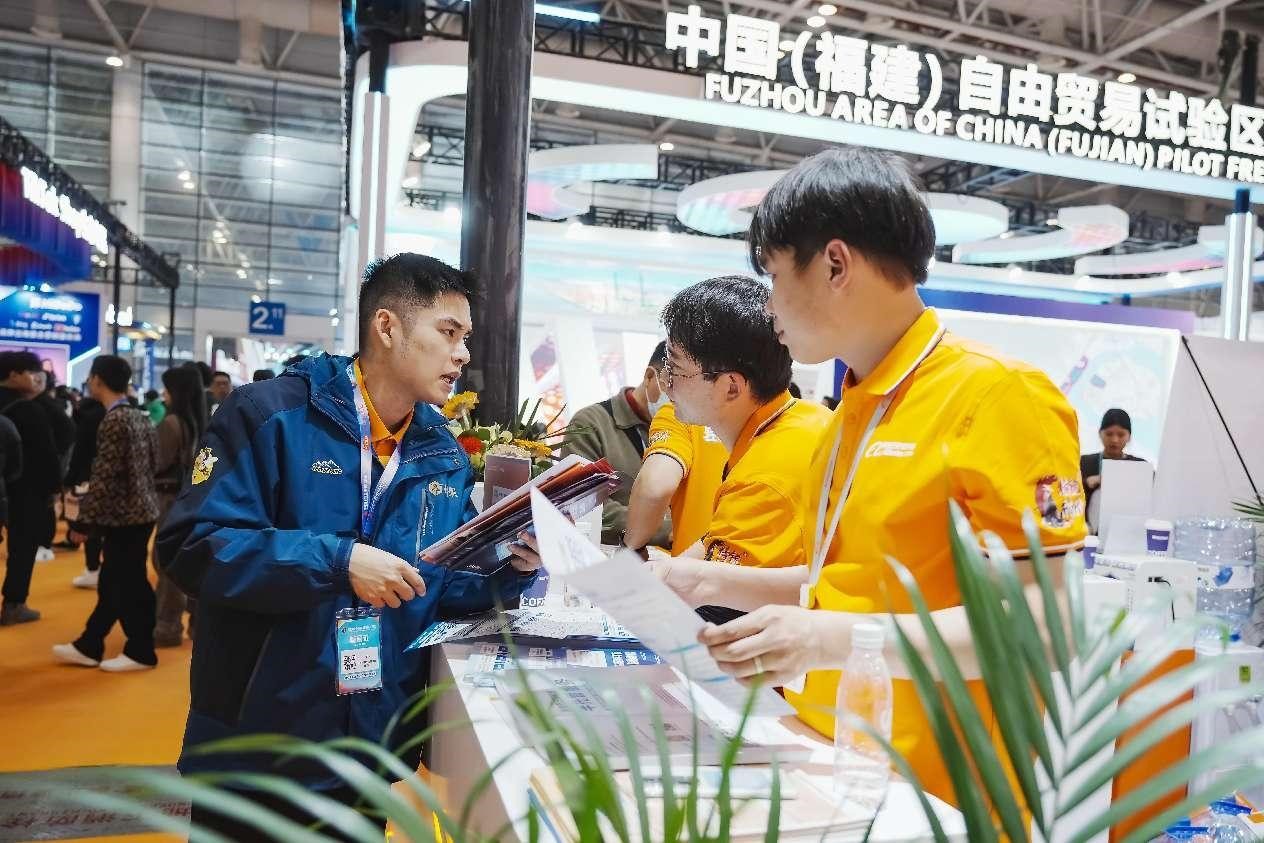China's young factory owners embrace cross-border e-commerce
In response to the gradual decline of traditional foreign trade channels, a growing number of "second-generation factory owners" in China are turning to cross-border e-commerce platforms to sell their products globally.
Wang Bowen, a Yale University graduate and second-generation factory owner in Wuyi county, Jinhua city, east China's Zhejiang Province, is one such entrepreneur. Wuyi county is one of the world's largest production bases for thermal cups, selling hundreds of millions annually.
The 29-year-old's parents have operated Zhejiang Maibo Industrial, a thermal cup factory, for decades.

Staff members of an exhibitor at the 4th China Cross-border E-commerce Trade Fair in Fuzhou, southeast China's Fujian province talk to a visitor, March 18, 2024. (People's Daily Online/Xie Guiming)
In 2023, the factory's cups became difficult to sell through traditional channels. In response, Wang decided to try selling the cups through Temu, a cross-border e-commerce platform launched by China's online retail giant Pinduoduo. To his surprise, several hundred cups sold shortly after launching on the platform.
"In the past, we served as an original equipment manufacturer (OEM) for foreign brands. Due to factors like sluggish international demand and highly homogeneous products, our factory registered low profits," Wang said. He added that the one-stop services provided by cross-border e-commerce platforms have opened new opportunities for OEMs.
These one-stop cross-border e-commerce services have addressed long-standing challenges in international trade, such as high logistics costs and a lack of skilled personnel, which have been traditionally problematic for small- and medium-sized enterprises (SMEs).
Similarly, Liu Wenhai, a second-generation factory owner born in 1990, has found success selling hats produced by his parents' factory in Rizhao city, east China's Shandong Province, through a cross-border e-commerce platform.
Leveraging cross-border e-commerce has become a common practice for second-generation factory owners like Wang and Liu in the Yangtze River Delta and Pearl River Delta regions.
According to customs authorities at Shanghai Pudong International Airport, export declarations from three leading Chinese e-commerce platforms increased by more than tenfold in 2023 compared to the previous year, highlighting the growing importance of these channels for Chinese manufacturers.
There are currently over 100,000 companies engaged in cross-border e-commerce in China.
These platforms have provided a new business infrastructure for companies seeking global expansion, according to Li Mingtao, head of the Research Institute at the China International Electronic Commerce Center.
An industry report released in February 2024 revealed that the Yangtze River Delta region hosted 32 comprehensive pilot zones for cross-border e-commerce in 2023, representing about one-fifth of the national total.
The Yangtze River Delta and Pearl River Delta regions, two major manufacturing hubs in China, have become significant sources of cross-border goods, according to Han Wei, business director of Temu.
China has introduced a series of policies to support the development of cross-border e-commerce, encouraging second-generation factory owners to explore new business opportunities.
"I was previously reluctant to just run an OEM factory," said Wang, who created a thermal cup brand and opened a new store on Temu this year.
Chinese brands are now selling products directly to overseas consumers on cross-border e-commerce platforms, encouraging the growth of globally recognized Chinese brands, Wang noted.
The platforms should encourage SMEs to focus on innovation and independent intellectual property rights (IPRs) to enhance their competitiveness in the global market, said Wang Jian, director of the Department of International Business and Cooperation of the School of International Trade and Economics at the University of International Business and Economics.
In addition, relevant departments should intensify efforts to protect the original innovations of micro-, small-, and medium-sized enterprises expanding overseas, Wang added. He suggested refining measures to safeguard IPRs, including business improvements, cultural creativity, and guidance mechanisms for responding to overseas IPR disputes. Furthermore, he called for increased guidance and support for manufacturing companies and small- and medium-sized foreign trade merchants.
In April 2023, the Ministry of Commerce announced plans to develop a model that combines cross-border e-commerce with industrial belts, promoting the export of more characteristic products based on the country's 165 comprehensive pilot zones for cross-border e-commerce.
Photos
Related Stories
- China's cross-border e-commerce platforms gain popularity overseas
- Language skills push cross-border online sales
- Chinese online stores gain popularity among Finns: report
- Southeast Asian livestreamers shine at cross-border e-commerce trade fair in Fuzhou
- 4th China Cross-border E-commerce Trade Fair kicks off in SE China's Fujian
- China issues guideline to boost e-commerce in rural areas
Copyright © 2024 People's Daily Online. All Rights Reserved.









